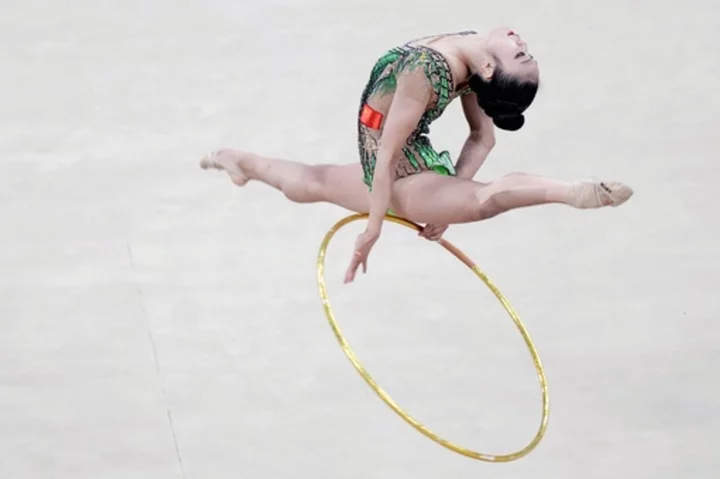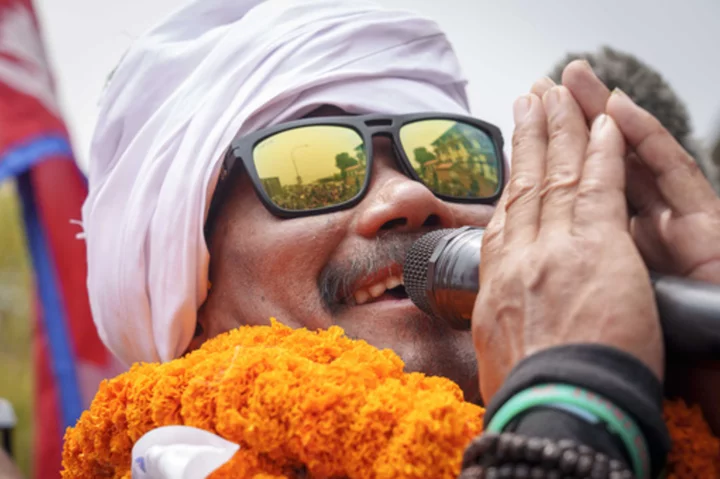HANGZHOU, China (AP) — Chinese swimmer Wu Shutong took Asian Games gold Friday in the 10-kilometer race, finishing seconds ahead of her competition from Japan in the more-than two-hour race, which she swam just days after her 18th birthday.
“I find it a little hard to believe,” she told reporters.
Wu spent most of the race behind Japan’s Airi Ebina and her Chinese teammate Sun Jiake, but was able to turn it up a notch near the end as Ebina started to slightly falter.
“She didn't have the strength and couldn't speed up, so I accelerated to catch up,” Wu said. “I just swam as hard as I could, nothing too tactical.”
Wu finished with a time of 2 hours, 3 minutes, 36.4 seconds, only 8.5 seconds ahead of Ebina and 21.5 seconds ahead of Sun. Taiwan's Teng Yu-Wen was more than four minutes behind in fourth place.
Wu, who turned 18 on Tuesday, said she felt lucky to be able to celebrate her birthday at the Asian Games. “Competing in the Hangzhou Asian Games is my gift for my birthday,” she said.
Ebina said she was a “little disappointed” but still happy to have won the silver medal. “Before the race I had planned to take the lead for the whole race, and keep the peak form for myself,” she said. "It was unfortunate that I couldn’t keep it until the end, but I’m happy with the result.”
The Asian Games feature 12,500 participants from 45 nations and territories — more than the 10,500 from about 200 delegations expected at next year’s Paris Olympics.
Chinese athletes have typically dominated the competition and this year is no exception with more than 340 medals won by Day 13 of the 15-day event, more than half of them gold.
South Korea and Japan have been jockeying for second place in the overall medal count, but each has fewer than half of China's total.
DRAGON BOAT
In the popular Dragon Boat races, China's women took gold in the 1,000-meter final, but its men had to settle for silver behind a strong Indonesian team.
The sport features a team of 12 paddlers in long, narrow boats decorated with Chinese dragon heads, who row to the beat of a drummer in the bow, with a steerer in the stern to guide the boat.
After edging out Indonesia by a fraction of a second to win the 500-meter gold Thursday, China's men lost by a fraction of a second to them in Friday's 1,000-meter race.
“Indonesia is quite strong,” China's Lv Luhui said.
Myanmar's men took bronze.
In the women's race, China's team won by nearly four seconds, with Indonesia finishing second and South Korea taking bronze.
The Chinese women also took gold in the earlier 500-meter and 200-meter races.
“The dragon boat spirit is a representation of our national spirit of China and we have been training hard for a long time," coach Chen Zhong said.
By contrast, South Korea's Lee Hyeonjoo said her sprint-oriented team had only prepared 20 days for the longer race, adding that they were more than pleased with third place.
“I am so happy now,” she said. “China is a strong team, they are very good. We just didn't have as much power as them.”
KAYAK
Sixteen-year-old Yekaterina Tarantseva, by far the youngest competitor in the event, won bronze in the women's kayak for Kazakhstan.
She said it had been an “amazing and unforgettable experience” to compete at the Asian Games, and that it had given her new confidence.
“I didn't believe this could happen, but I fought to the end,” she said. “All my opponents are older, and I was a bit afraid, but I fought all the way.”
Taiwan's Chang Chu-Han, 30, won the gold and China's Li Lu, 31, took silver.
In the men's canoe, China's Xie Yuancong won gold, with Anvar Klevleev from Uzbekistan taking silver and Kazakhstan's Alexandr Kulikov winning bronze.
___
AP sports: https://apnews.com/sports









